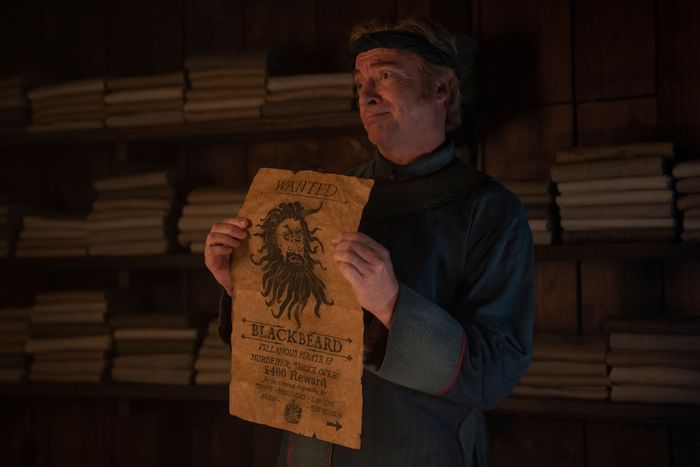
In its first season, Our Flag Means Death subverted nearly every assumption one could make of a show about pirates. The crewmates of the Revenge weren’t flatly masculine, individualist conquerors besotted with wenches or waging wars for ego. These were kinder and gentler outcasts, a found family whose modernist interest in talking about their feelings — their many, many feelings — was a gleeful counterpoint to the series’ period-piece setting and swordplay. They wanted to love and be loved as they were and without judgment, so that they could better cut their way across the high seas on a quest for blood and treasure. Piracy and self-discovery went hand in hand, and the second season, premiering with three episodes on Max on October 5, is a fun time when it puts that interconnectivity toward a workplace-comedy vibe that encompasses the entire ensemble. When it spends too much time on one particular relationship with this tableau, though, Our Flag gets caught in the doldrums.
Our Flag Means Death blew up with a certain fandom thanks to the Revenge’s many boatmances, primarily the one between “Gentleman Pirate” Stede Bonnet (Rhys Darby), an aristocrat who ditches his discomfiting family life to buy the Revenge and hire a crew, and the infamous Captain Blackbeard (Taika Waititi, also serving as executive producer), a.k.a. Ed, who has been wearing villainous leathers for most of his life and might be the most feared pirate alive. Their awkward, tender, and aching bond spawned AO3 opuses and adoring fan art, as did the series’ other queer and opposites-attract romances: grumpy Black Pete (Matthew Maher) and dandyish scribe Lucius (Nathan Foad), and best friends turned lovers Olu (Samson Kayo) and Jim (Vico Ortiz).
As the first season progressed, the Revenge became a live-and-let-live environment — until Stede broke it off with Ed and spun him back into the murder and marauding that made Blackbeard notorious. Season two foregrounds that breakup and those other romantic pairings, all of which now have their own problems. It’s an effective way to generate episode-spanning tension, to give the actors different emotional notes to play, and to introduce some new characters that help Our Flag Means Death’s world feel bigger. But this siloing of couples also disrupts the series’ previously freewheeling energy; their passion — plus Waititi’s half-manic, half-self-pitying performance — becomes a bit predictable. The prevailing emphasis on Stede and Ed also creates an irregular pace that does a disservice to the supporting characters by first meandering and then sprinting through story lines involving them; a cliffhanger ending for seventh episode “Man on Fire,” the last one provided for review, probably would have had more impact if the crew drama leading up to it felt less abrupt.
Still, the series remains fairly charming, with Darby’s longing sighs, aghast expressions, and haughty tone making the Gentleman Pirate a singularly silly yet sympathetic character. And although the plot machinations are a bit more contrived this time around, when Darby and his castmates are able to put their earnest goofiness to workplace-comedy use, Our Flag Means Death really clicks. Premiere “Impossible Birds” begins some time after season one ended with the brokenhearted Blackbeard stealing the Revenge and persuading some of its crew, including Jim, to join him. As they wreak amoral havoc (including one exceptionally amusing set piece where they raid a wedding ship and then discuss their PTSD from said raiding while eating the cake), Stede and his remaining loyalists are stuck on the Republic of Pirates, struggling to save enough money to buy a new ship. While Stede writes Ed pining letters and throws them into the ocean, message-in-a-bottle style, Ed veers between love and loathing, their oppositional views forming the season’s backbone.
As Stede and the crew muddle through their “rebuilding phase” and get involved with a mysterious soup vendor (welcome addition Ruibo Qian), Blackbeard’s bad behavior charts two roads for Our Flag Means Death. In the serious one, Waititi plays the character as sublimely self-destructive and desperate to talk about his traumas, an arc that returns more than once to his suicidal desires (which are handled a little too lightly). In the sillier one, the series furthers its season-one positioning of Ed as a bad boss who undervalues his employees, especially first mate Izzy (scene-stealer Con O’Neill, whose accent has somehow gotten even more wonderfully gravelly). The latter path’s transposing of office-culture issues onto the Revenge leads to the season’s most humorous stuff, like the crew planning a holiday party, being interviewed by another pirate captain who offers them better benefits, and scoffing their way through a tone-deaf apology from a higher-up. And the series has a flair this season for one-off, episodic plots, like guest actors Minnie Driver and Rachel House luxuriating in antagonistic sexual chemistry as friends from Ed’s past, and a possibly possessed velvet-and-brocade suit that appeals to Stede’s vanity but turns the superstitious crew against him.
When using that sort of breeziness to power its sails, Our Flag Means Death most strongly evokes something like Miracle Workers or What We Do in the Shadows — a hangout show that maintains a long-standing love story (Daniel Radcliffe and Geraldine Viswanathan’s characters on the former, Nandor/Guillermo and Nadja/Laszlo on the latter), but also uses genre tropes and absurd situations to deepen its characters. When Our Flag Means Death effectively integrates its amorous subplots into its main narrative (as a way to contrast Stede and Ed’s leadership styles, say), the series hits on a balance that indulges both its leads and everyone else, and gives their various concerns suitable weight. Intermittently, though, Our Flag Means Death feels counterintuitively constrictive, like the very love it’s advocating for is inadvertently cutting other characters out of this story. These romances are edging ever closer to becoming narrative riptide — Stede and Ed’s in particular flirts with fan service — and Our Flag Means Death needs to free itself from the churn before it loses the collective identity that is the show’s strongest asset. This show has an endless expanse of sea in which to sail, and its second season is best when it goes exploring.





